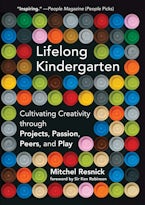A remarkable book. Part educational philosophy, part scholarly memoir, part cultural manifesto, it weaves these elements together beautifully in a single captivating narrative. This is one of the best modern books on education that I have read.
Michael Eisenberg, University of Colorado
Wonderfully thought-provoking and mind-expanding. I've waited a long time for a book like this. Changing Minds certainly changed my mind about how best to proceed with computers, learning, and literacy and even changed my mind about what literacy is.
John Seely Brown, Chief Scientist, Xerox, and author of The Social Life of Information
Changing Minds offers the deepest and most profound discussion to date on what 'literacy' should mean in the digital age.
Mitchel Resnick, MIT Media Laboratory
This is a powerful book that shows through theory and examples how computers can engage intuitive knowledge, expanding thinking and really 'change minds.' It is beautifully written and convincingly argued. Everybody interested in education and in the potential of computer use should read it.
Celia Hoyles, Mathematical Sciences Group, Institute of Education, University of London
Andrea diSessa is on a life-long mission to change education, to expand our understanding of literacy, and ultimately, to change our view of how people think. In this book, diSessa argues for a radical change to our educational system, one supported by 15 years of research. The tool that makes his venture possible is the computer, but diSessa does not confuse the means with the end. This book is a chronicle of diSessa's pursuit of his dream, of the children and teachers who worked with him, and of the many obstacles he faced. The quest is audacious, and the recommendations sensible.
Donald A. Norman, President, UNext Learning Systems, and author of The Invisible Computer
In Changing Minds, Andrea diSessa challenges readers to rethinking what it means to be literate in today's technological world. The book offers a nuanced vision for computational literacy buttressed by stunning examples from diverse fields including education, physics, engineering, and the history of science. diSessa synthesizes over 15 years of research exploring the impact of a computational medium—software called Boxer—on the minds of students. Anyone connected to teaching, learning, technology, children, or schools will find this book essential, provocative, and capable of changing minds.
Marcia C. Linn, Graduate School of Education, University of California, Berkeley











